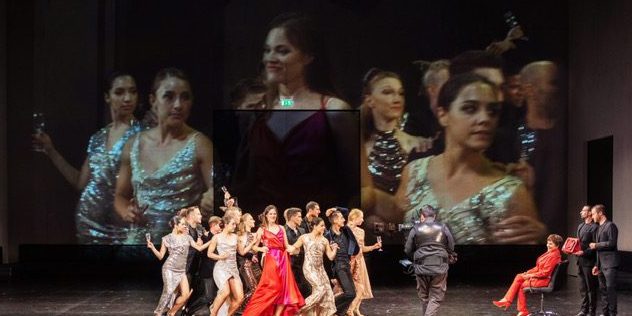The acclaimed mezzo-soprano Cecilia Bartoli, who has been the artistic director of the Salzburg Whitsun Festival since 2012, has presented this year the early Handel’s oratorio Il trionfo del Tempo e del Disinganno, which has now been revived for the main Summer Festival.
This oratorio written in 1707, when Handel was only 22, after a libretto by Cardinal Pamphili, is a philosophical meditation between four allegorical characters Bellezza (Beauty), Piacere (Pleasure), Disinganno (Disillusion), and Tempo (Time). Tempo and Disinganno try to persuade Bellezza to abandon the pursuit of empty pleasures and to devote her life to higher values. In the end, of course, the two succeed, thus leaving a scorned Piacere in her rage. A very rich musical score characterises this oratorio: the singing ranges from dazzling coloraturas to longing and poignant melodies to vengeful blazes, while the orchestration captivates the audience with its baroque opulence.
The director Robert Carsen succeeds in making this moralistic text resonate with a modern sensibility and achieves this by setting the scene on a sort of X-Factor stage where a Salzburg 2021 beauty contest takes place. Bellezza who is the winner is engaged in a contract with a devilish, red-dressed agent Piacere, who drags her to a world of glamorous parties fuelled with sex and drugs. The dancers move as if they were in a nightclub but with baroque background music. Il leggiadro giovinetto (the fair boy) of one of Piacere’s arias becomes in this production a famous DJ who eventually ends up having a steaming affair with Bellezza. In the meanwhile cameramen film Bellezza on the stage and stream her live on a screen with a photoshopped reality.
The counterpoint to this frivolous atmosphere is provided by the meditation on the subject of memento mori of Disinganno and Tempo, the latter dressed in black like a priest. As they enter on stage the light turns cold and the atmosphere eerie. Disinganno acts like a psychotherapist and starts together with Tempo a work of interior exploration and self-awareness. However, this process is very painful and Bellezza is torn between those two worlds. We can see this on stage and hear it in the music that moves away from the initial firework coloratura and simply becomes more and more lyrical ad heartbreaking. The link with and reference to today’s world, obsessed by beauty and youth and endless pleasure, is clear and inevitable. Plenty of symbols accompany the narrative arc of Bellezza, but the mirror is the pivotal one. The small lighted mirror, a symbol of vanity in the opening scene, becomes a huge mirror covering all of the stage and reflecting the audience back to itself, i.e. the reality as it is, and that is the turning point when Bellezza decides to embraces a more meaningful life. In the end she leaves the scene from an empty backstage through the service door.
The four interpreters are outstanding: Regula Mühlemann is a real Bellezza in every sense, her struggle is convincing, her acting natural, her coloratura is not very agile, but she infuses her singing with intense lyricism. Cecilia Bartoli in the role of Piacere is a bossy and ruthless agent. Bartoli’s voice still has its renowned agility and precision while her incredible filati keeps the audience on edge, although she is not singing with full power and sometimes struggles to fill the auditorium with her voice. Charles Workman in the role of the seriously pedantic Tempo comes across initially as a bit dull, but the tenor lines are sung with laser-like precision and find full expressivity as he progresses, especially in the final duet with Lawrence Zazzo in the role of Disinganno. Zazzo possesses a clear and beautiful countertenor voice that is always on pitch and he steals the show a few times with the intensity of his interpretation and the precision of his singing.
The fifth great interpreter of this evening is the orchestra: the original sound ensemble Les Musiciens du Prince-Monaco under the baton of Gianluca Capuano. Capuano uses a very broad dynamic creating fascinating sound effects from the darkest to the brightest, from the slowest to the fastest, a real feast for the ears.
This is a real trionfo and rightly deserved the standing ovation.

